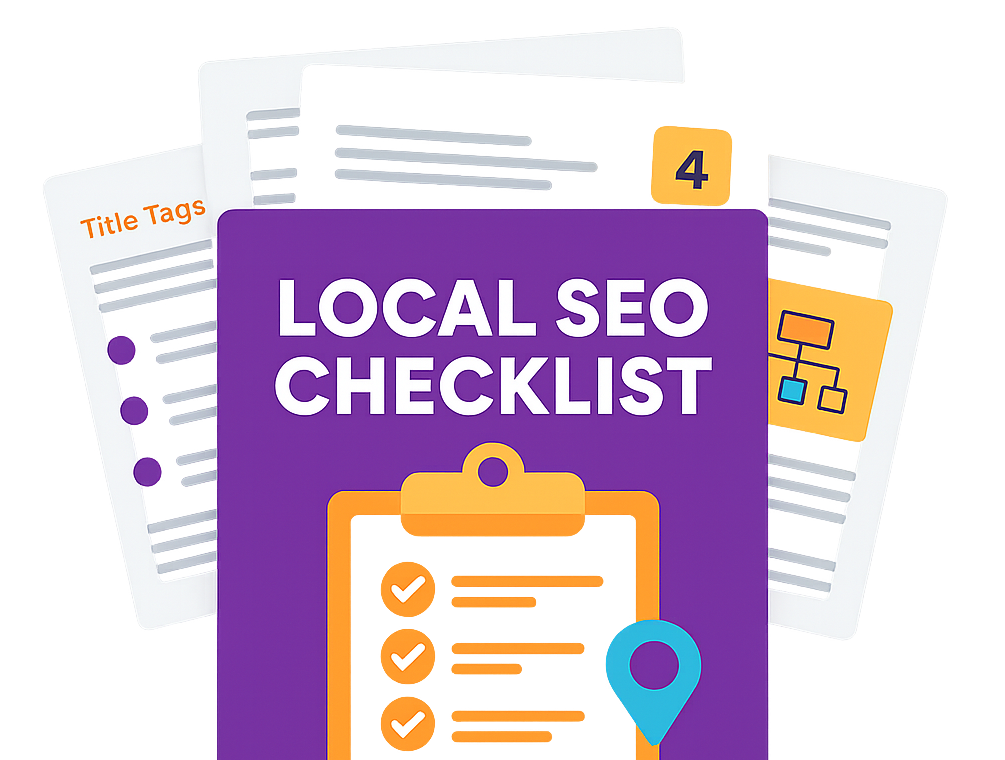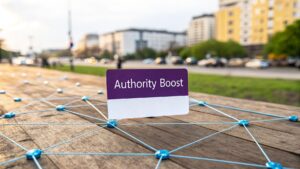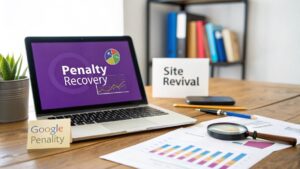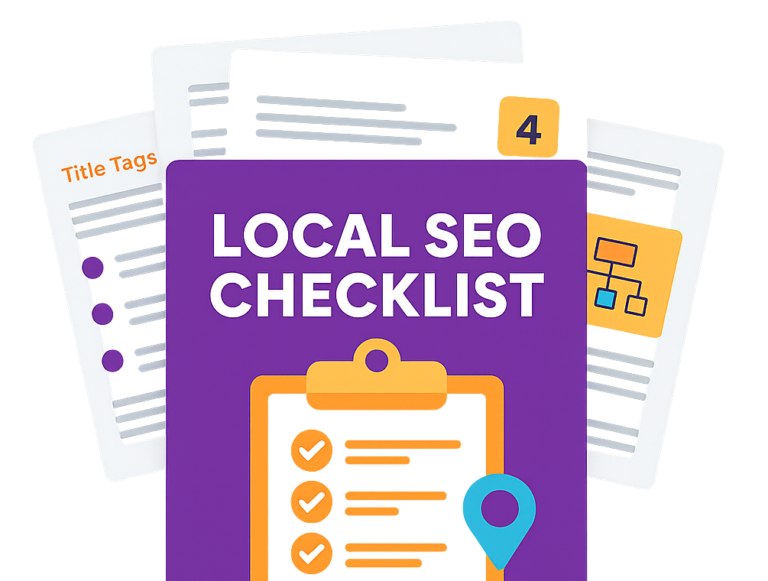Forget thinking of SEO as just another cost on the spreadsheet. For a small UK business, it's about building a genuine, long-term asset. It's your single best shot at standing shoulder-to-shoulder with the big players, delivering a return that the endless money pit of paid advertising just can’t touch. This guide is your no-nonsense plan to start building that asset, using real-world tactics that won’t drain your bank account.
Why SEO is a Game-Changer for UK Small Businesses
When you’re running a small or medium-sized business, getting noticed can feel like shouting into the wind. Your time is stretched thin, the budget is tight, and your competitors seem to have bottomless pockets. This is exactly where search engine optimisation (SEO) steps in. It’s the tool that turns your website from a passive online brochure into your hardest-working salesperson, pulling in leads 24/7.
Here’s the thing about paid ads: the moment you stop feeding them money, they stop working. SEO is different. It’s about building equity. Every tweak you make, every helpful blog post you write, every local directory you get listed in adds value over time. Think of it as the difference between renting a billboard and owning the prime spot on the digital high street.
Building Your Digital Foundations
For a small business, getting this foundation right is everything. A solid SEO strategy means that when someone in your town searches for what you sell, you’re the one who shows up. This isn't about chasing random website visitors; it's about getting in front of motivated customers who are ready to buy.
And in the UK, this isn't just a nice-to-have. Small businesses are the backbone of the economy, making up 99.9% of the business population—that’s around 5.9 million of us. With over 53% of all website traffic coming from organic search and a tiny 0.63% of people ever clicking past Google’s first page, being visible is non-negotiable. If you want to dig deeper, you can explore more data on the value of SEO for small businesses to see just how critical it is.
The Real Return on Your Investment
The payoff from a smart, affordable SEO plan goes way beyond just getting more clicks. It builds your brand’s credibility, positions you as the go-to expert, and creates growth that lasts. The benefits stack up quickly:
- More Visibility: You’ll rank higher, catching the eye of customers actively looking for you.
- Greater Credibility: Showing up on the first page of Google is a huge trust signal. It tells people you’re a serious player.
- Cost-Effective Marketing: SEO delivers compounding returns, making it one of the most budget-friendly channels in the long run.
- A Real Competitive Edge: You can start outranking local rivals and grab a bigger slice of the market.
SEO gives small businesses the power to level the playing field. It's not about outspending the competition; it's about outsmarting them by connecting with customers when and where it matters most.
This guide is here to cut through the noise. We're skipping the confusing jargon and technical overload. Instead, you'll get practical, step-by-step advice designed for the UK market, helping you put real strategies into action that deliver results without needing a massive budget.
Starting Your SEO Journey on a Tight Budget
Jumping into search engine optimisation doesn't have to drain your bank account. The truth is, with the right game plan and a bit of elbow grease, you can make a real difference with very little cash. It's all about focusing on the high-impact tasks you can tackle yourself to build a solid foundation.
Your first move? A DIY SEO audit. Don't let the name scare you; it's just like giving your website a quick health check to see what's working and what needs a bit of TLC. You don't need fancy, expensive software to get going—there are free tools out there that give you a mountain of useful data.
Uncovering Insights with Free Tools
Google gives you two of the most powerful diagnostic tools available, and they won't cost you a penny. Getting them set up is the first practical step you can take towards a more visible website.
- Google Search Console: Think of this as your direct line to Google. It shows you which keywords your site is already ranking for, points out any technical gremlins holding you back, and gives you a peek into how searchers are seeing your site.
- Google Analytics: This one is all about understanding your audience. It tells you where your visitors are coming from, which pages they're sticking around on the longest, and how they move through your site.
By checking in on these tools regularly, you can diagnose technical glitches, get a handle on your performance, and spot the "low-hanging fruit"—those quick fixes that can bring in noticeable results without costing anything. To build out your toolkit even further, you can explore some of the best free SEO tools available to small businesses.
This whole process shows how a small, upfront investment of your time can lead to serious growth, turning your website into a valuable digital asset.
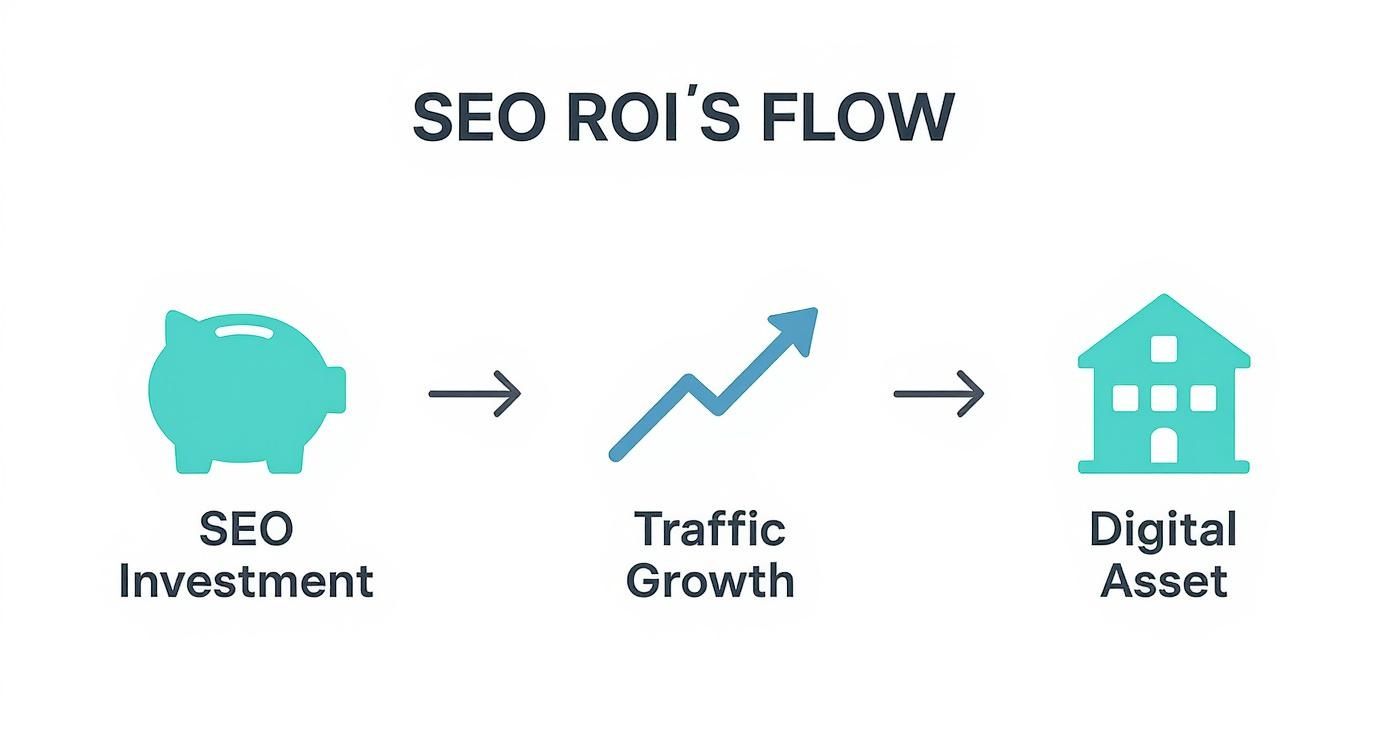
As you can see, consistent SEO efforts steadily build up traffic and authority. Over time, your website becomes a powerful engine that generates business all on its own.
Finding Your Niche with Smart Keyword Research
Once you've got a good read on your website's health, it's time to tackle keyword research. This is simply the process of figuring out the exact phrases your potential customers are typing into Google. For a small business, the goal isn't to go head-to-head with the big players for really broad, competitive terms.
Instead, the secret to affordable SEO for small business is targeting long-tail keywords. These are longer, more specific search phrases. They might have less search volume, but they almost always have much higher buyer intent.
It’s like this: someone searching for "shoes" is probably just window shopping. But a person searching for "waterproof walking boots for men in Cambridge" knows exactly what they're after and is probably ready to buy.
By focusing on these specific, niche phrases, you face less competition from larger companies and attract visitors who are far more likely to convert into customers. This is the essence of working smarter, not harder.
You can unearth these gems by using free keyword tools, peeking at the "People Also Ask" section in Google's search results, or just by paying attention to the exact language your customers use. These phrases are the golden nuggets that will drive your content and optimisation strategy. When you create content that directly answers these very specific questions, you position your business as the perfect solution, drawing in high-quality traffic without the high price tag.
Mastering On-Page SEO Without Hiring an Expert
On-page SEO might sound like a job for a technical wizard, but it's really not. At its heart, it’s about making your website's content clear, helpful, and dead simple to understand—for both people and search engines.
It’s about signalling what your page is about in a way Google can instantly recognise. Think of it as tidying up your shop's window display and adding clear signs so customers know exactly what you sell the moment they walk past.
The best part? Many of these crucial jobs can be handled in-house, making it a cornerstone of any affordable SEO for small business strategy. By focusing on these fundamentals, you can make a serious dent in your rankings without spending a penny.
The Anatomy of a Perfectly Optimised Page
Every single page on your website is another chance to rank. To give each one its best shot, you need to get the core elements right. These are the signals search engines rely on to figure out your content's relevance and quality.
To make this easier, here’s a quick checklist of the essential on-page elements you should review for every key page on your site. Think of it as your pre-flight check before you hit "publish."
On-Page SEO Checklist for Small Businesses
| SEO Element | What to Do | Why It Matters |
|---|---|---|
| Compelling Title Tag | Keep it under 60 characters and include your main keyword. Make it enticing enough for someone to click. | This is your headline in Google's search results. It’s the first thing anyone sees. A good title tag boosts click-through rates. |
| Intriguing Meta Description | Write a short, punchy summary of the page (under 160 characters). Think of it as an advert for your content. | While not a direct ranking factor, a great meta description convinces users your page has the answer, driving more traffic. |
| Logical Header Tags | Use one H1 for your main title. Structure the rest with H2s and H3s to create a clear hierarchy, like chapters in a book. | Headers make your content scannable for readers and help search engines understand the structure and main topics of your page. |
| Descriptive Image Alt Text | Write a brief, accurate description of each image. Be concise but clear. | Alt text helps visually impaired users and gives search engines context, helping your images rank in Google Images. |
These elements all work together to build a crystal-clear picture of what your page is all about. For a deeper dive into perfecting these fundamentals, you can explore some of our expert insights into on-page SEO best practices.
Nailing these basics consistently across your site is a massive step in the right direction. It’s simple, effective, and completely within your control.
Building a Web of Connections with Internal Links
Think of internal linking as creating a logical, easy-to-follow map for your website. It’s simply the act of linking from one page on your site to another relevant page. This simple action has two incredibly powerful benefits.
First, it helps your visitors discover more of your great content, keeping them on your site longer and gently guiding them towards your most important pages—like a contact form or a product page.
Second, it helps search engines understand the relationships between your pages and spreads "link equity" (or authority) throughout your site, making your website stronger as a whole.
A strong internal linking structure is like having a helpful guide on your website, constantly pointing visitors and search engines towards your best and most relevant information.
Don't Forget Site Speed and Mobile-Friendliness
In today’s fast-paced world, nobody has the patience to wait for a slow website to load. It's that simple. Site speed is a confirmed Google ranking factor, and a slow site will send frustrated visitors clicking away in seconds.
Similarly, with more searches now happening on phones than on desktops, having a mobile-friendly website is completely non-negotiable.
Here are some low-cost ways to improve both:
- Compress Your Images: Large, unoptimised images are one of the biggest culprits of slow load times. Use free online tools like TinyPNG to shrink their file size without sacrificing quality. It takes seconds.
- Choose Good Hosting: Don’t be tempted by the absolute cheapest hosting plan you can find. A reliable UK-based hosting provider can make a huge difference to your site's performance for just a few extra quid a month.
- Use a Responsive Design: Make sure your website's design automatically adjusts to fit any screen size, from a huge desktop monitor to a small smartphone. Thankfully, most modern website themes and builders do this automatically.
Focusing on these on-page factors is one of the most cost-effective ways to improve your SEO. It puts you in direct control of your site's ability to rank and provides a solid foundation for all your other marketing efforts.
How to Dominate Local Search in Your Area
For most small businesses, winning the local search battle is everything. It’s not about being famous worldwide; it’s about becoming the go-to choice for customers right on your doorstep. This is where you can truly outshine the big, faceless corporations by building real connections within your community.
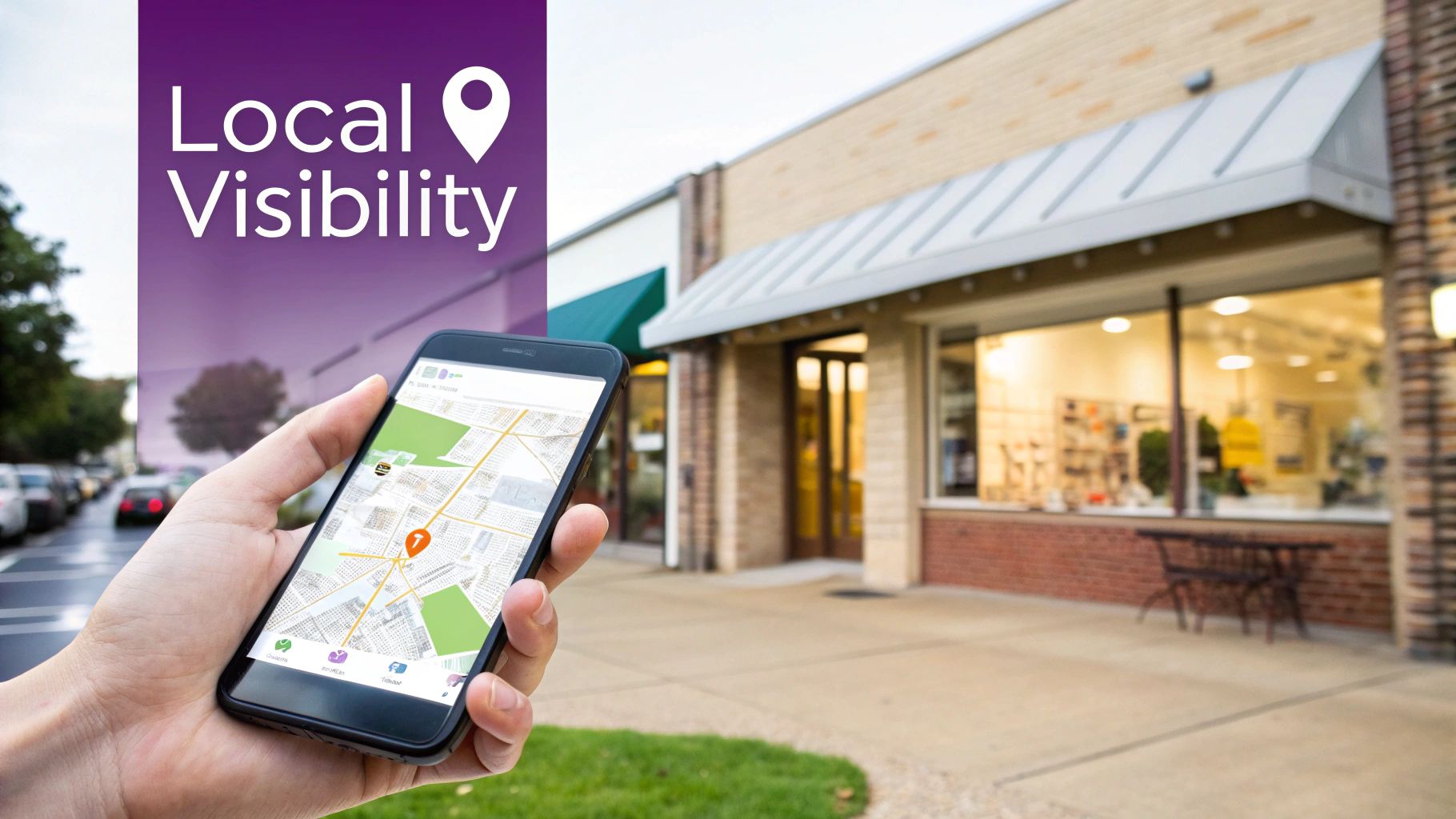
Think of local SEO as digital word-of-mouth. When someone in your town searches for what you offer, the goal is to land in that coveted "map pack"—the box of three local listings sitting proudly at the top of Google's search results. Nailing a spot here is like having a shopfront on the busiest high street.
This is arguably the most impactful and affordable SEO for small business owners, period. It puts you in front of customers with the highest buying intent: people who are actively looking for a solution now and near them.
Your Most Powerful Local SEO Tool: The Google Business Profile
Your Google Business Profile (GBP) is the absolute cornerstone of your local search presence. It’s a free listing that works like a mini-website right inside Google’s results, and getting it right is non-negotiable.
An unclaimed or half-finished profile is a massive missed opportunity. A fully fleshed-out profile, on the other hand, quickly becomes a powerful customer-generating machine. For a step-by-step walkthrough, our guide on Google Business Profile optimisation gives you all the actionable tips you need to get going.
To really make your GBP work for you, focus on these key areas:
- Complete Every Single Section: Fill out your business hours, services, product photos, and a detailed description. The more info you give Google, the better it can match you to relevant local searches.
- Use Google Posts: Regularly share updates, special offers, and company news. This signals to both Google and your customers that your business is active and engaged.
- Enable the Q&A Feature: Get ahead of the game by adding and answering common questions yourself. It helps you control the narrative and gives potential customers valuable information straight away.
The Importance of Consistent NAP Citations
Beyond your Google profile, consistency is king. Your NAP (Name, Address, Phone number) details need to be identical everywhere they appear online, from your website to local business directories.
Imagine handing out business cards with slightly different addresses on each one; it would just confuse people. The same thing happens online. Inconsistent NAP data confuses search engines and makes them question your business’s legitimacy, which can tank your rankings.
Think of each consistent citation as a vote of confidence for your business's location and contact details. The more consistent votes you have across the web, the more Google trusts that you are who and where you say you are.
Start by getting your NAP spot-on in your website’s footer and on your contact page. Then, look for listings in reputable UK directories like Yell, Thomson Local, and other portals specific to your industry. To really get a competitive edge in your area, this practical guide to local SEO for small businesses is an indispensable resource.
Encouraging and Managing Customer Reviews
Positive reviews are digital gold. They are one of the most powerful signals for local search rankings and a massive sign of trust for potential customers. A steady stream of recent, positive feedback tells Google that your business isn't just real, but also genuinely valued by the local community.
Make it dead simple for happy customers to leave you a review. You can create a direct link to your Google review page and share it in follow-up emails or even on your receipts. And don’t forget to respond to all reviews—good and bad—in a professional way. Engaging with feedback shows you actually care about the customer experience.
Putting time into your local optimisation pays off big time. In fact, UK-based local service providers with SEO-optimised websites see lead conversion rates as high as 19.5% from high-intent local searches. With many hyper-local businesses spending a manageable £50 to £600 per month on SEO, it’s a highly effective strategy. Learn more about these Google SEO statistics and see the potential impact for yourself.
Creating High-Value Content on a Small Budget

Great content is the engine of modern SEO, but you don’t need a royal budget to get it running. For small businesses, the best content ideas are usually hiding in plain sight, just waiting to be uncovered. It’s all about a pragmatic approach to creating genuinely useful articles and guides without spending a fortune.
The secret isn’t pumping out endless blog posts; it’s about creating the right content. This means directly answering the real-world questions, problems, and headaches your customers have every single day. Just think about the queries you handle over the phone or by email—each one is a potential blog post.
This strategy plays right into what search engines want: to give people the most helpful and relevant answers. When your content nails that, you’re already on your way to earning better rankings and attracting customers who are actually looking for what you offer.
Building Topical Authority with Content Clusters
Instead of writing random, disconnected blog posts, you need a smarter plan. That's where the content clustering model comes in. Think of it like writing the definitive book on a subject you want to be known for, where each blog post is a chapter. It’s a cornerstone of any solid, affordable SEO for small business strategy.
Here’s how the model works:
- Pillar Page: You start with a big, comprehensive guide on a core topic for your business (e.g., "A Beginner's Guide to Garden Landscaping"). This page covers the subject from a high level, hitting all the main points.
- Cluster Content: Next, you create several shorter, more specific blog posts that dive deeper into the sub-topics mentioned on your pillar page (e.g., "Choosing the Right Plants for a Shaded Garden," or "Low-Cost Patio Ideas").
- Internal Linking: Finally, you link all these specific "cluster" posts back to the main pillar page, and the pillar page links out to them. Simple.
This structure does wonders for your SEO. It signals to Google that you have deep expertise in that subject. By covering a topic from every angle, you build topical authority, which makes it much easier for all of those pages to rank well.
Content clustering transforms your blog from a random collection of articles into an organised, authoritative resource. It tells search engines you're not just a commentator—you're an expert in your niche.
Turning Customer Questions into Compelling Content
Honestly, the best content ideas come straight from your customers. They’re already telling you exactly what they need to know. If you just listen and keep track of their most common questions, you’ll have a near-endless supply of topics that are guaranteed to be relevant.
Here are a few content formats that work brilliantly for small businesses:
- Detailed FAQ Pages: Don't just list a few questions. Build an in-depth FAQ page that gives thorough answers to the top 10-15 questions new customers always ask.
- How-To Guides: Walk people through a process, step-by-step. A local bakery could write a guide on "How to Decorate a Birthday Cake Like a Pro."
- Local Guides: Create content that’s hyper-relevant to your local area. A Cambridgeshire-based estate agent might create a "Guide to the Best Primary Schools in Cambridge."
This customer-first approach is incredibly effective. Trends show a huge increase in demand for affordable SEO education in the UK since 2016. With 42% of UK consumers using search engines to find local businesses—more than double those who rely on social media—creating content that answers their questions is a must. You can discover more insights about these UK SEO statistics to see just how powerful organic search really is.
The Art of Content Repurposing
Creating one great piece of content takes time and effort, so why let it be a one-hit wonder? Content repurposing is the art of taking a single asset and slicing and dicing it into multiple formats. It lets you maximise its reach and value without multiplying your workload.
For instance, one detailed blog post could be turned into:
- An eye-catching infographic that summarises the key takeaways.
- A series of social media posts for LinkedIn, Facebook, or Instagram.
- A short explainer video for YouTube.
- A checklist or downloadable PDF guide to capture email subscribers.
This method lets you squeeze every last drop of value out of the content you create. It reinforces your message on different platforms, appeals to people who prefer different formats, and saves you a huge amount of time—making it a perfect tactic for any business keeping a close eye on the budget.
Building Authority with Affordable Link Building
Link building often feels like the most intimidating part of SEO, something reserved for big companies with deep pockets. But it doesn't have to be. Think of backlinks as digital recommendations; when another reputable website links to yours, it sends a powerful signal to Google that your content is trustworthy and worth paying attention to.
The good news? A smart SEO plan for a small business doesn't involve chasing hundreds of links. The real goal is to earn quality, relevant links that build genuine credibility. It’s all about quality, not quantity.
Leveraging Your Local Community for Links
For most small businesses, the best and most accessible link-building opportunities are right on your doorstep. These links are incredibly relevant and can drive targeted traffic from customers who are literally just around the corner.
Here are a few ethical, low-cost tactics that actually work:
- Sponsor a Local Event: Supporting a local charity run, school fete, or community festival nearly always comes with a link back to your website from their event page. It’s a win-win for brand visibility and SEO.
- Forge Local Partnerships: Team up with a complementary, non-competing business. Imagine a wedding photographer partnering with a local florist to create a shared guide to planning a local wedding—both businesses link to each other, sharing authority and traffic.
- Join Local Business Organisations: Memberships in bodies like your local Chamber of Commerce usually include a listing in their online directory. That’s an easy and valuable backlink right there.
Think of local link building as digital networking. By actively participating in your community, you naturally create opportunities for other local organisations to mention and link to your website, strengthening your local authority online.
Earning Links Through Relationships and Content
Beyond your immediate community, you can leverage the business relationships you already have to earn powerful backlinks. You've already done the hard work of building trust; now it's time to ask for a digital nod of approval. For a more detailed breakdown, our guide explains how to build backlinks with a practical, step-by-step approach: https://www.bare-digital.com/how-to-build-backlinks/
Another great strategy is small-scale digital PR. This isn't about hiring a pricey agency. It’s about creating something genuinely newsworthy, even on a small scale. You could compile unique data about your local area—like a survey of the most popular dog-walking spots—and share it with a local blogger or journalist. When looking at ways to boost your site's authority, you might find that specialised services, such as Digital PR Link Building Packages, can really support your efforts.
Start by asking your happiest customers for testimonials. If they have their own business blog, they might be willing to write a case study about their fantastic experience with you and include a link. In the same vein, reach out to your suppliers. Many have a "partners" or "stockists" page on their website where they could easily add a link back to your site. These are the kinds of authentic, relationship-based links that search engines love to see.
Your Questions Answered: Small Business SEO Explained
Getting your head around search engine optimisation can feel a bit daunting, especially when you’re watching every penny. To clear things up, here are some straight answers to the questions we hear most from UK small business owners.
How Long Does Affordable SEO Take to Show Results?
Let’s be honest: SEO is a marathon, not a sprint. While you might see some small wins from on-page tweaks in just a few weeks, the real, meaningful results—like a steady climb in rankings and more website traffic—typically take 4 to 12 months to kick in.
Think of it like planting a tree. You don’t get a giant oak overnight. The timeline really depends on how competitive your industry is and how consistently you put in the work. The beauty of budget-friendly SEO is that it builds sustainable, compounding growth over time. You’re not just getting a quick fix; you're building a valuable digital asset for your business.
Can I Really Do SEO Myself for My Small Business?
Yes, absolutely. You don’t need to be a tech wizard to get started. Many of the most important SEO tasks are completely manageable for a motivated business owner, and the strategies and free tools in this guide are more than enough to get you on the right track.
Here's what you can confidently tackle on your own:
- On-page optimisation: Writing clear title tags and meta descriptions, and using headers to organise your content.
- Google Business Profile management: Keeping your local listing accurate and fresh is a huge win.
- Content creation: Nobody knows your customers' questions better than you. Turn those answers into helpful blog posts.
Down the line, as your business grows, you might want to bring in a specialist for the more complex stuff. But you can build an incredibly strong foundation all by yourself.
SEO isn’t about being a technical genius from day one. It’s about consistently taking small, smart steps that add up to big results over time. Your dedication is your greatest asset.
What Is the Most Important Part of SEO for a Local UK Business?
For any local UK business, the hands-down most critical element is Local SEO. This is all about targeting customers right in your neighbourhood—the people who are most likely to walk through your door or pick up the phone.
The absolute cornerstone of this is your Google Business Profile. It's what gets you seen in Google Maps and those all-important 'local pack' results at the top of the page. After that, focus on getting genuine customer reviews and making sure your business name, address, and phone number (NAP) are identical everywhere online.
How Much Should a UK Small Business Budget for SEO?
This is the million-pound question, and the answer really depends on your approach. If you’re rolling up your sleeves and doing the work yourself, your biggest investment is your time.
If you decide to hire some help, a hyper-local business can often find effective services for between £50 and £600 per month. For a more in-depth campaign with a freelance consultant or a small agency, you’re likely looking at a range of £300 to over £1,500 per month. The trick is to find a partner who is transparent and focused on giving you a clear return on your investment.
At Bare Digital, we specialise in creating bespoke SEO strategies that deliver market-leading results at a fraction of the cost. Get a free, no-obligation SEO Health Check and a tailored Activity Plan to see how we can help your business grow. Get Your Free SEO Proposal Today.


